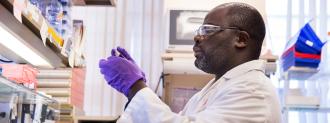An antibody drug developed to treat people with COVID-19 is now being tested in humans for the first time.
The medication (known as LY-CoV555) is the first drug developed specifically to treat COVID-19 to be tested in people (all other human trials involve drugs meant for other diseases that existed prior to the COVID-19 pandemic).
If it works as hoped, the antibody drug could potentially help COVID-19 patients battle the disease — and maybe even prevent highly vulnerable populations from catching the coronavirus in the first place.
Developing an Antibody Drug
When a virus or bacteria infects a person for the first time, their immune system creates blood proteins called antibodies to help it identify and kill the pathogen in the future.
More than a century ago, doctors discovered that convalescent plasma therapy (CPT) — transfusing a survivor’s antibody-rich blood plasma into someone still battling the disease — can help with their recovery.
That knowledge has made coronavirus antibodies a promising lead in the effort to find a treatment for COVID-19.
We want to be ready to deliver the drug to patients as quickly as possible.
Daniel Skovronsky
To create a coronavirus antibody drug, scientists at the Canadian biotech firm AbCellera started with a blood sample from a single coronavirus survivor. Using custom technology, they isolated every immune cell from the sample — all five million of them.
After the cells began producing antibodies, the researchers identified 2,000 different antibodies that could bind to the coronavirus, potentially preventing the virus from being able to infect human cells.
Using the genetic material from those antibodies, AbCellera recreated 500 of them in the lab, put them through a slew of tests, and then analyzed the results with proprietary software.
“If you can imagine trying to sift through that data on a spreadsheet, it would be an impossible task,” AbCellera CEO Carl Hansen told IEEE Spectrum. “We built this (software) recognizing there is a real bottleneck between what a machine can collate and understand, and what a person can actually interact with.”
At that point, AbCellera teamed up with Eli Lilly, a U.S.-based pharmaceutical company, and together, they narrowed the 500 candidates down to 24 that showed particular efficacy against the coronavirus in lab and animal testing.
LY-CoV555 was one of them.
Antibody Drug Vs. Blood Plasma
On June 1, Eli Lilly began testing various doses of the new antibody drug on 32 hospitalized COVID-19 patients in the U.S. The company expects to have the results of that study before the end of June, and if LY-CoV555 is proven safe, it hopes to launch large efficacy trials soon after.
They have good reason to expect positive results from those trials, too — numerous studies have found CPT to be both safe and effective at treating people with the coronavirus.
Beyond its promise as a treatment for COVID-19 patients, researchers suspect that blood plasma from coronavirus survivors might also produce a sort of temporary immunity in people who don’t have the virus.
If it does, convalescent plasma therapy could be useful as a preventative measure for vulnerable populations (frontline workers, elderly or immunocompromised people, et al) until a coronavirus vaccine is ready.
CPT does have some weaknesses, though. A single blood plasma donation from a coronavirus survivor is only enough to treat one COVID-19 patient, making sourcing enough to treat everyone with the virus a major undertaking.
Additionally, any type of blood transfusion carries certain risks for the recipient, such as a negative transfusion reaction.
The goal is to have several hundred thousand doses available by the end of the year.
Daniel Skovronsky
LY-CoV555 could provide the same benefits as CPT while avoiding its shortcomings. Not only does it only contain what COVID-19 patients need — an antibody that can effectively bind to the coronavirus — it can also be produced in the lab.
In fact, Eli Lilly is already laying the groundwork to mass-produce the antibody drug should the human trials go well.
“At the same time as we are investigating safety and efficacy, we also are starting large-scale manufacturing of this potential therapy,” Daniel Skovronsky, Eli Lilly’s chief scientific officer, said in a press release.
“If LY-CoV555 becomes part of the near-term solution for COVID-19, we want to be ready to deliver it to patients as quickly as possible, with the goal of having several hundred thousand doses available by the end of the year,” he added.
We’d love to hear from you! If you have a comment about this article or if you have a tip for a future Freethink story, please email us at [email protected].






